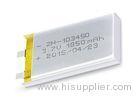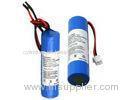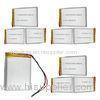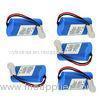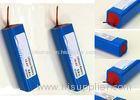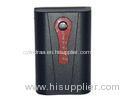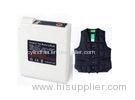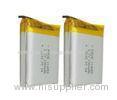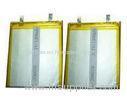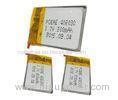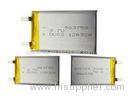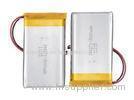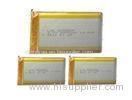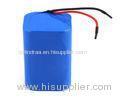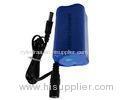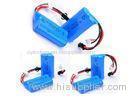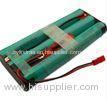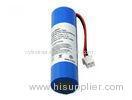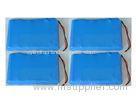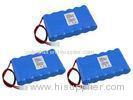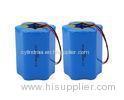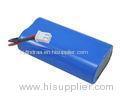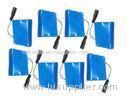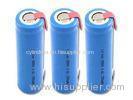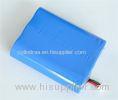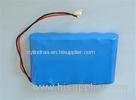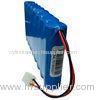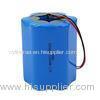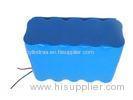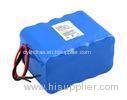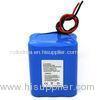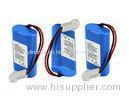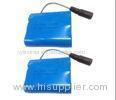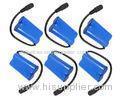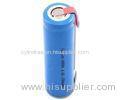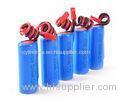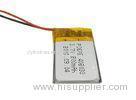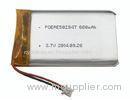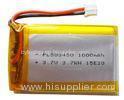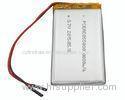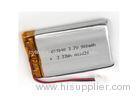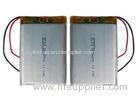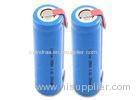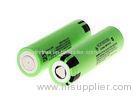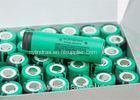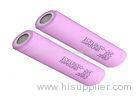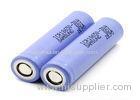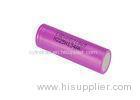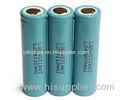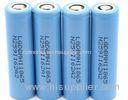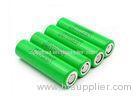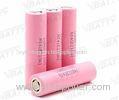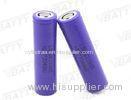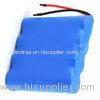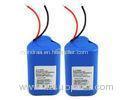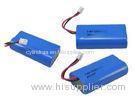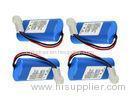|
ShenzhenGreenEnergyTechCompany
|
Rechargeable Battery Pack 18650 1S6P 3.7V 13.2Ah for portable electronics products With Samsung ICR1
| Place of Origin: | Zhejiang, China (Mainland) |
|
|
|
| Add to My Favorites | |
| HiSupplier Escrow |
Product Detail
Rechargeable Battery Pack 18650 1S8P 3.7V 13.2Ah for portable electronics products With Samsung ICR18650-22F Cells</stro
Rechargeable Battery Pack 18650 1S8P 3.7V 13.2Ah for portable electronics products With Samsung ICR18650-22F Cells
The battery is a rechargeable battery best suited to mobile devices that require small-size, light weight and high performance. Its characteristics of high energy and high voltage (3.7V/Cell) powerfully fulfill these three key requirements. Its standard battery-pack, coupled with a charger, facilitates simple equipment design.

Product Description
- Li-ion Battery Pack 3.7V 13.2Ah
- Product Description
- 1S8P 3.7V 13.2Ah Lifepo4 battery pack
- Cycle life more than 500
- Nominal capacity:13.2Ah
- Discharge cutoff voltage:2.5V
- Environmental protection battery
Our Service
- Replying your inquiry in 24 working hours.
- Customized is welcome. Accepting OEM/ODM.
- Professional battery factory ang technical engineers guarrantee the quality of the products.
- Fast delivery for we have cooperated with many express companies such as DHL, FedEx, TNT etc..
- Well trained staffs offer first class service.
- Welcome your suggestions.

Detail Description
| 18650/1S6P Li-ion Battery Pack 3.7V/13.2Ah | |||
| Model: ICR18650-22F-1S8P | |||
| Item | Specification | Remark | |
| Nominal capacity13.2 | Ah | SAMSUNG Cell: 18650-22F | |
| Nominal voltage | 3.7V | 3.7V / 1Cell | |
| Charging voltage | 4.2V±0.05V | 4.2V / 1Cell | |
| Charging method | CC/CV | (Constant-current and -Voltage with Limited current | |
| Standard charging time | 2000mA/5hour,3000mA/3.5hour | Battery capacity÷charging current×1.5 | |
| charging current | 6.6A(0.5C) | 0 ~ +40ºC | |
| Maximum charging current | 13.2(1C) | 0 ~ +40ºC | |
| Continuous discharge current | 13.2(1C) | -20 ~ +60ºC | |
| Discharge cutoff voltage | 2.5V | 2.5V / 1Cell | |
| Short circuit protection | Exterior short circuit | Automatic recovery | |
| Internal resistance | ≤200mΩ | AC Impedance 1kHz | |
| Cycle life | ≥500 | ||
| Operating temperature | Standard Charge | 0 ~ +40ºC | |
| Standard Discharge | -20 ~ +60ºC | ||
| Outline dimension | L133*W74*T20mm | Length x wide x height | |
| Pre-wired | Red = Positive,Black = Negative | ||
| Protection Circuit Module: | |||
| Maximal continuous charging current | 5A | ||
| Maximal continuous Discharging current | 5A | ||
| Over-charge detection voltage | 4.25 V ±0.025V | single cell | |
| Over-charge release voltage | 4.05±0.05V | single cell | |
| Over-charge detection delay time | 0.7S-1.3S | single cell | |
| Over-discharge detection voltage | 2.40V±0.062V | single cell | |
| Over-discharge release Voltage | 3.0±0.10V | single cell | |
| Over-discharge detection delay time | 89-167mS | single cell | |
| Over-current detection | 12±2A | can adjust | |
| Over-current delay time | 6.7ms-13.9ms | ||
| 18650/1S6P Li-ion Battery pack | |||

Features:
- Adopt Brand New and Grade A Samsung ICR18650-22FM 2200mAh cell
- Longer power time
- Remain 80% Capacity after 500 charge-discharge cycles
- Japan SEIKO protection IC
- Less self-discharge (approx. 1/10) compared with a Ni-MH or Ni-Cd batteries as well as no memory effect.
Application:
- Backup Power System
- Portable Medical Equipment
- UPS power
- Safty and Security Device
- Test Instruments
- Portable Electronic Products
Lithium Battery FAQ:
What is the difference between Lithium batteries and Lithium Ion batteries?
There are several important differences. The practical difference between Lithium batteries and Lithium-ion (Li-ion) batteries is that most Lithium batteries are not rechargeable but Li-ion batteries are rechargeable. From a chemical standpoint Lithium batteries use lithium in its pure metallic form. Li-ion batteries use lithium compounds which are much more stable than the elemental lithium used in lithium batteries. A lithium battery should never be recharged while lithium-ion batteries are designed to be recharged hundreds of times.
What are the advantages of Lithium Ion batteries compared to other rechargeable batteries?
Lithium-ion batteries have several advantages:
They have a higher energy density than most other types of rechargeables. This means that for their size or weight they can store more energy than other rechargeable batteries. They also operate at higher voltages than other rechargeables, typically about 3.7 volts for lithium-ion vs. 1.2 volts for NiMH or NiCd. This means a single cell can often be used rather than multiple NiMH or NiCd cells.
Lithium-ion batteries also have a lower self discharge rate than other types of rechargeable batteries. This means that once they are charged they will retain their charge for a longer time than other types of rechargeable batteries. NiMH and NiCd batteries can lose anywhere from 1-5% of their charge per day, (depending on the storage temperature) even if they are not installed in a device. Lithium-ion batteries will retain most of their charge even after months of storage.
So in summary; lithium-ion batteries can be smaller or lighter, have a higher voltage and hold a charge much longer than other types of batteries.
What are the disadvantages of Lithium Ion batteries compared with other rechargeable batteries?
Lithium-ion batteries are more expensive than similar capacity NiMH or NiCd batteries. This is because they are much more complex to manufacture. Li-ion batteries actually include special circuitry to protect the battery from damage due to overcharging or undercharging. They are also more expensive because they are manufactured in much smaller numbers than NiMH or NiCd batteries. Li-ion batteries are becoming less expensive and over time we should see their price decrease significantly.
Lithium ion batteries are not available in standard cells sizes (AA, C and D) like NiMH and NiCd batteries.
Lithium-ion batteries also require sophisticated chargers that can carefully monitor the charge process. And because of their different s




